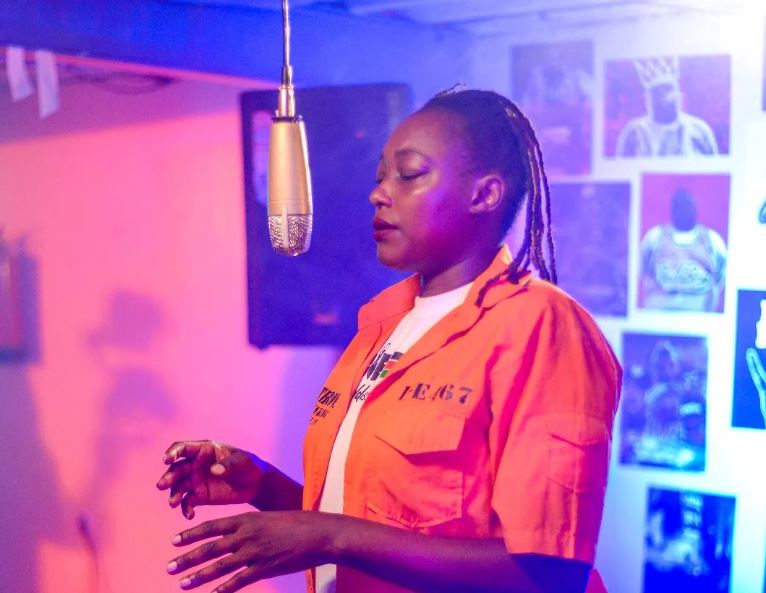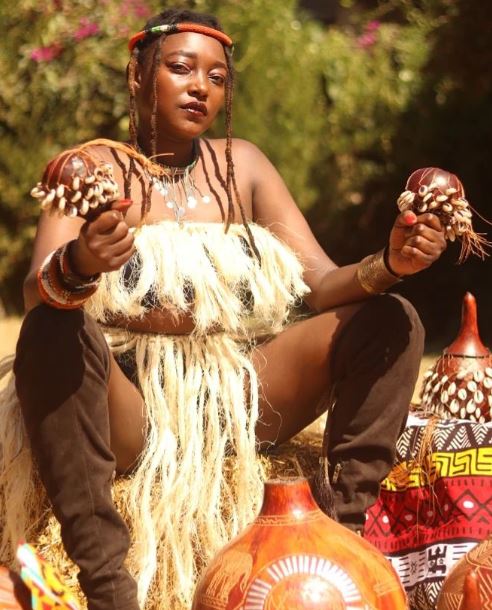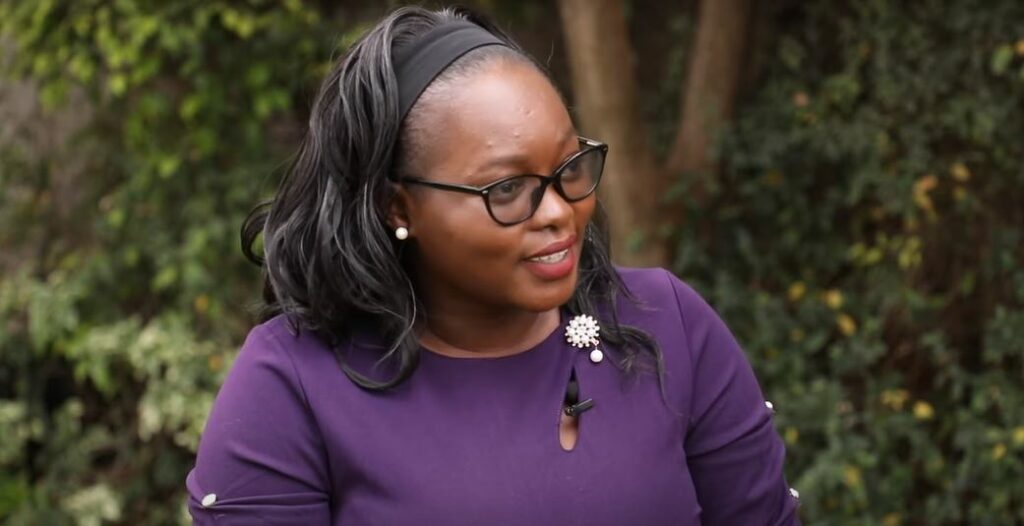
You have various alter egos; tell us about that.
MC Sharon, the brand, is four different personas. The face of the brand is MC Sharon – I also go by Alshaverb – this is the writer and the lyricist. Decibelle is the production aficionado, who I fondly refer to as the goddess of sound and most recently, Achieng Ajuoga, the ethnomusicology practitioner who also doubles up as the Oracle of Muhoroni Town.
What inspired you to do music?
I come from an Adventist background so music has always been in my life. When I schooled in Alliance Girls’ High School I was drawn to the classical aspects of music and I used to play the piano. I was expelled from Alliance and I found myself in Tala Academy. There was no piano, no choir, no music festivals and music was not among the subjects I could take. In the absence of music equipment and music lessons, I started leaning heavily towards rap music. We would create rhythms by knocking on the desktops and freestyle to our thoughts. During the holidays, I started to attend jam sessions and it is through that platform that I managed to find my way to Bruce Odhiambo’s Johari Cleff Studios. There I recorded my first song Word on The Street/ Ready for War, and that was my official debut into the Kenyan scene.
How would you describe the type of music you typically make?
My music is an amalgamation of different sounds and genres ranging from hip hop and rap to Afro soul, world music and even reggae. Of late I have been tapping into my ethnic Luo roots in a bid to authenticate my sound even further. I have also been singing and rapping on Afrobeats, Amapiano, Benga and Highlife. In short, I pay allegiance to no genre. I am here for my craft and being diverse has allowed me to tap into my musicality more than ever before.
What is your creative process like?
My creative process is as spontaneous as it is fluid. Sometimes I create a song from a preexisting track or melody and sometimes I create them from scratch. This I do by either producing the track and flowing as I go or with an instrumentalist; either from my band or from outside it. I can create anything anytime anywhere and my environment as well as my feelings are instrumental to these creations.
Your Song ‘Juu On Top’ was very good.
Juu on Top is a personal account of the things I was going through in my life at the time. I was surrounded by users, and backstabbers and what I did in the song is exactly what I did in real life. I chose to chin up and travel light on my way to the proverbial top. I wrote what I felt as honestly as possible and after I had spoken about the problems I decided to focus on the solution. That is why I am a one-man battalion in that song.
You have rubbed shoulders with the likes of Abbass Kubaff, what does this mean for your catalogue?
Abbas is a longstanding brother, friend and colleague and we have known each other for years. Abbachiwa is the track I did with Doobeez and Chiwawa. I was five months pregnant with my second born, Sulwe. Working with a pioneer is always a good thing. I had so much fun on the project even though I only did the hook and did not drop any bars.
How many Collective projects do you have in your name?
I have about 23 projects and 2,500 songs that I have done over the years. The most common ones include Seven Days, African Warrior, Hustlers Ground, G.E.M.S, The Last Will and Testament, The UA Initiative, Black Book and Ugwe Romo Gi Yimbo.
What inspired you to write your most recent book, ‘Alkebulanian in Alkebulan’?
Alkebulanian in Alkebulan is an anthology I birthed during the pandemic. I was inspired to write it not only because a second book was long overdue but because I was disturbed by the fact that not enough Africans or rather Alkebulanians are telling their own stories in their own words. This book is a celebration of authenticity, honesty and perfect imperfection and it was inspired by various themes, which are central to African existence.
You are one of the few consistent femcees in the Hip Hop space. What has attributed to this success?
Consistency is relative because many would argue that I have not been as visible as I probably should have been. This is because I have been working in the shadows to horn my skills and give myself room to breathe and grow. The key to building a longstanding brand is resilience and the ability to rebrand.
You were part of Door Knockers Cypher Ep 5. What is your take on such initiatives?
The DKC5 was such a vibe in that I managed to connect with respectable colleagues on a timeless track, which made the hip hop community proud. Such initiatives are powerful because of their ability to connect artistes from different eras, different flavours and different cities. That is the power of hip hop and good music in general.
What next for Sharon?
I have been working day and night in my home studio and I have a few albums, tapes, videos and a documentary lined up. I have also been honoured with the opportunity of making music for one documentary and one film. It is going to be a good year.
What has been your biggest achievement so far?
I have managed to heal myself from past trauma and abuse and I have kept myself alive. Just managing to stay alive through the darkest times is an achievement of its own and I would be accurate to say that music saved my life. Music is my life. It is the very air I breathe and it is something I would carry on with regardless of whether I became famous or not.
On a professional level, I have collaborated with different people from all over the world. My music has been played in international festivals and radio stations courtesy of the likes of the legendary Chuck D, Coco Em, Tabu Osusa, and many others and I now have fans from all over the globe. I have managed to carve out my niche as a musical human rights defender and my work has been used to create awareness about serious issues; including the upcoming SGBV documentary that was shot in Luoland by my colleagues in New York.
Source: Pulse Magazine/Standard









